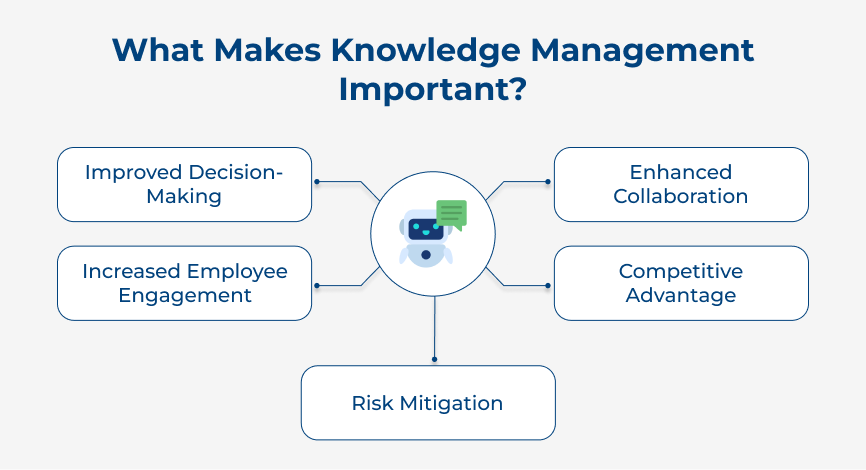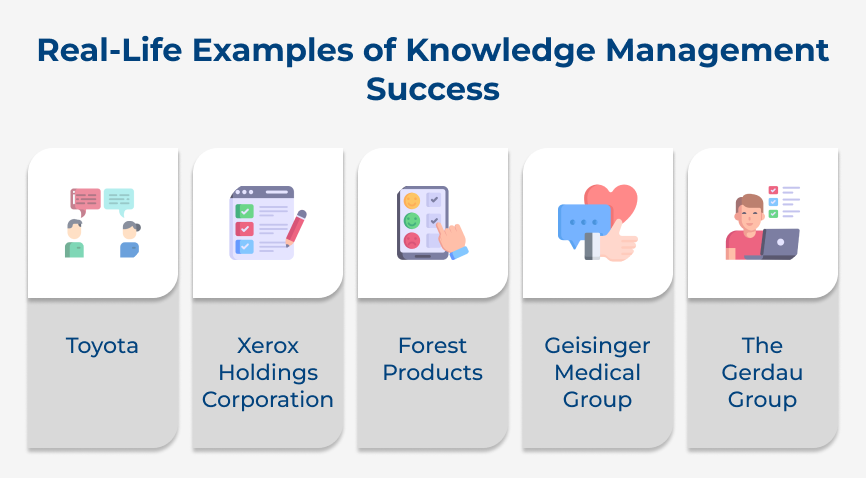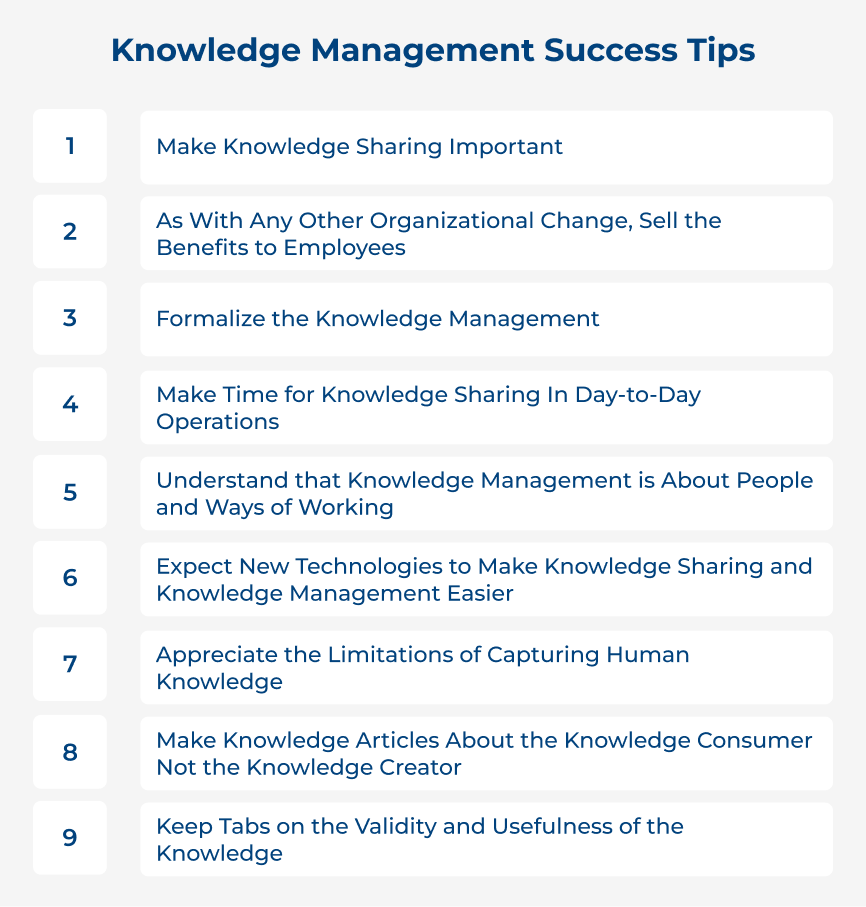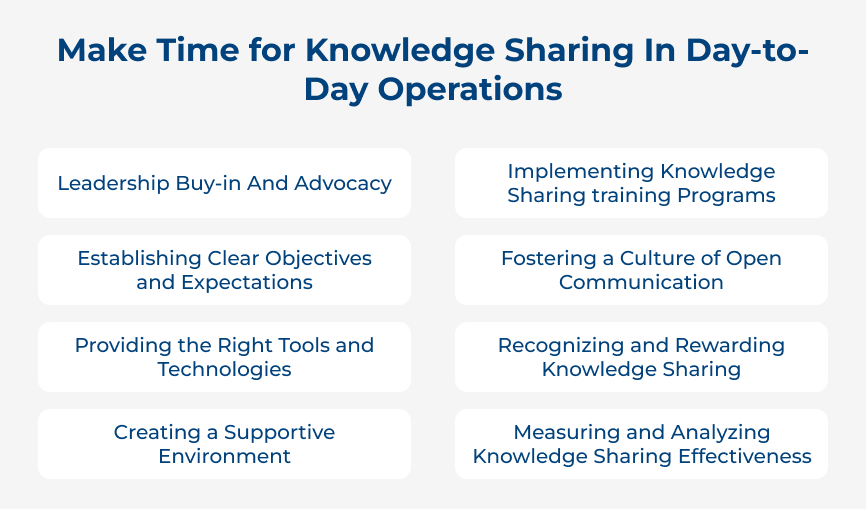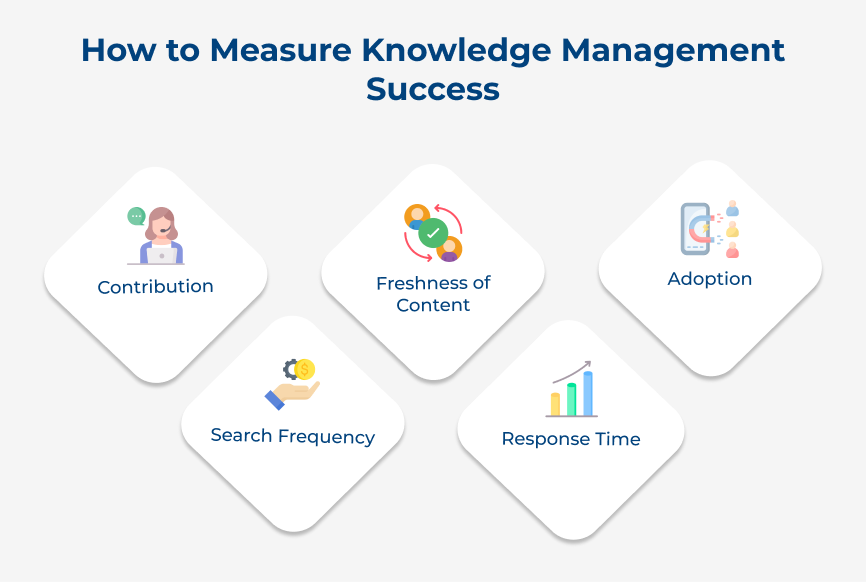The importance of the tip cannot be overstated. Without regular knowledge sharing, valuable insights and expertise can be lost or underutilized. It leads to missed opportunities for growth and innovation. One use case for implementing the tip is during team meetings or brainstorming sessions. Encourage team members to share insights, experiences and resources that benefit the group.
Best practices:
- Schedule regular knowledge-sharing sessions or workshops where team members can share their expertise on specific topics.
- Create a centralized knowledge-sharing platform, such as an internal wiki or collaboration tool. It can help team members to easily access and contribute to shared knowledge.
- Recognize and reward team members who actively engage in knowledge-sharing activities, to incentivize continued participation.
5. Understand that Knowledge Management is About People and Ways of Working
When it comes to knowledge management, it’s important to understand that it’s not just about systems and tools. It is about people and ways of working. The importance of the tip cannot be overstated. People are the ones who create, share and use knowledge within an organization. Businesses can benefit from an effective knowledge management strategy that focuses on how people work.
A use case for the tip could be a company that is struggling to effectively share knowledge among team members. The company can improve knowledge sharing by focusing on people and their collaboration, leading to a more streamlined process.
Best practices:
- Encourage open communication and collaboration among team members. Create a culture where sharing knowledge is not only encouraged but expected.
- Invest in training and development for team members to improve their skills in knowledge management.
- Utilize tools that facilitate collaboration and knowledge sharing, making it easier for team members to use knowledge effectively.
6. Expect New Technologies to Make Knowledge Sharing and Knowledge Management Easier
Knowledge sharing and management have become easier than ever before. It is a vital aspect of any organization. The practice ensures that valuable information is not only retained but also easily accessible to all members of the team.
The importance of efficient knowledge sharing cannot be overstated. It allows for better collaboration, more informed decision-making and improved performance. One use case could be a tech company implementing a knowledge management system. It allows all employees to share and access relevant information in real-time, leading to increased productivity.
Best practices:
- Utilize tools such as document management systems and intranets to facilitate seamless knowledge sharing within the organization.
- Promote an environment where employees are encouraged to share their expertise and insights with one another, whether through training sessions or online forums.
- Ensure that all team members are equipped with the necessary skills and knowledge to effectively utilize new technologies for knowledge sharing.
7. Appreciate the Limitations of Capturing Human Knowledge
Acknowledging the limitations of capturing human knowledge is crucial. Technology simplifies information capture, but storing all human knowledge digitally remains challenging. Appreciating the limitations is crucial for successful knowledge management.
Organizations can focus on capturing and storing valuable knowledge, including tacit knowledge that may not transfer easily digitally. One use case is in the healthcare industry. Medical professionals rely on both documented knowledge and their own experiences to make critical decisions. Healthcare organizations can prioritize human knowledge by understanding the limitations of knowledge management systems.
Best practices:
- Encouraging knowledge sharing through regular team meetings and collaboration tools.
- Creating a culture of continuous learning and development. It ensures that tacit knowledge is passed on through mentorship and on-the-job training.
- Using technology to supplement human knowledge by providing easy access to documented information and expertise, not replacing it.
8. Make Knowledge Articles About the Knowledge Consumer
When it comes to knowledge management, it is important to make knowledge articles about the knowledge consumer, not the knowledge creator. It means focusing on user experience and preferences rather than just documenting knowledge itself. The tip is important because it ensures that the knowledge is presented in a way that is easy to understand and relevant to the audience.
One use case is in a customer service setting, where agents need quick access to relevant information to assist customers. Tailoring knowledge articles to address common customer inquiries can improve response times and satisfaction among agents.
Best practices:
- Conduct user research to understand the needs and preferences of knowledge consumers.
- Use clear language in knowledge articles to make them easy to access and understand.
- Continuously gather feedback from knowledge consumers to improve the relevance and effectiveness of the knowledge articles.
9. Keep Tabs on the Validity and Usefulness of the Knowledge
Amid the internet’s vast information, ensuring knowledge validity and usefulness is essential. It is an essential tip for knowledge management success. The tip ensures that businesses are basing their decisions and actions on accurate information. Inaccurate or outdated knowledge can lead to costly mistakes in both personal and professional settings.
Businesses can make informed decisions that will benefit in the long run by regularly checking the validity and usefulness of the knowledge. A common use case is in the field of research. Researchers must assess source credibility regularly to maintain the findings’ accuracy. Researchers can maintain the integrity of their work by keeping tabs on the validity and usefulness of their knowledge.
Best practices:
- Conduct regular audits of the sources to ensure they are up-to-date and reliable.
- Seek feedback from peers or experts to validate the accuracy of the knowledge.
- Stay up-to-date on industry trends and best practices to ensure the knowledge remains relevant.
How to Measure Knowledge Management Success: 6 Key Metrics
Let us go through the critical metrics that can provide clarity on the success of your KM system, guiding you toward enhanced productivity and sustained growth.






